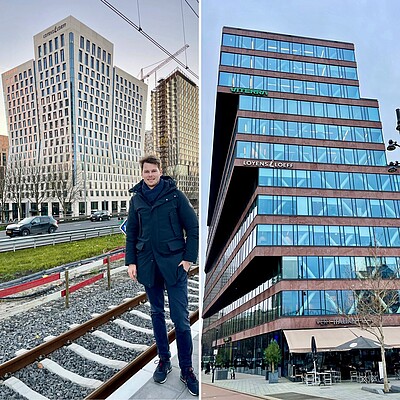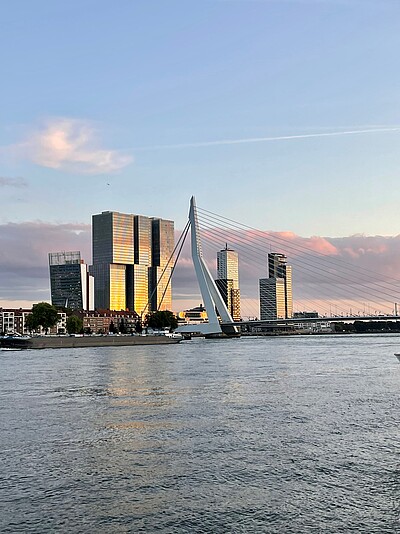

Our Bonn colleague Christian Heider spent four months on secondment at Loyens & Loeff in Rotterdam and Amsterdam. He tells us about his experience and offers some advice to people considering a secondment.
Flick Gocke Schaumburg: Christian, you worked at Loyens & Loeff in the Netherlands from September to December 2023. What was it about a secondment that appealed to you?
Christian Heider: I spent a lot of time abroad while I was at school and university, and have great memories of those times. That’s why I set myself the goal of gaining some work experience in another country. Most of my day-to-day client work deals with cross-border corporate taxation and transfer pricing, which means I work closely with our partner law firms. A secondment was the ideal opportunity to achieve my goal.

“I can wholeheartedly recommend a secondment. It gives you a chance to broaden your outlook and presents you with the challenge of networking and making contacts in different places.”
Dr. Christian Heider
What did your typical working day look like and what were your responsibilities?
I usually worked three days a week in Rotterdam and two days a week in Amsterdam. In true Dutch fashion, I commuted by bike in all weathers. I cycled either to the office in Rotterdam or to the station to catch the train to Amsterdam. Trains in the Netherlands are pretty reliable. In December, I also spent a week in each of the Loyens & Loeff offices in Zurich and Luxembourg to build up and expand my networks there.
We had weekly practice group meetings, which were mainly held in English for me. At these meetings we discussed current developments such as new case law and administrative directives, and teams each presented cases to the whole group. To introduce myself and my work to my Loyens & Loeff colleagues, I gave a series of presentations on current German tax topics at the practice group meetings and my visits to other offices.
I also took part in several client meetings where issues relating to tax in Germany were discussed. At the same time I had ongoing client work at FGS, which I handled remotely.

Personal network
“I expanded my network by having lunch with colleagues and going to the weekly get-togethers at the office bar on Friday evenings.”
What was working with your Dutch colleagues like, and how did you expand your network?
My colleagues had an open and direct style of communication, which made it much easier for me to become part of the team. But of course it’s also important to be proactive and introduce yourself to people. I also expanded my personal network by having lunch with colleagues and going to the weekly get-togethers at the office bar on Friday evenings. They were always very well-attended.
What advice would you give to people who are considering a secondment?
I can wholeheartedly recommend it. It gives you a chance to broaden your outlook and presents you with the challenge of networking and making contacts in different places. My secondment to Loyens & Loeff was a very enriching experience. I’d regret it if I hadn’t done it.
I think it’s important to have had a certain amount of experience before you go on secondment, so that you can work independently. When I met new people, one of the questions they often asked was, “How many years of experience have you had?” If you’re a few years along in your career, you’ll definitely be perceived differently and given more responsibility than if you were new to the profession. On the other hand, with increasing experience, it becomes more difficult to remove yourself from your ongoing client work.
How and when to consider a secondment is ultimately an individual decision.
